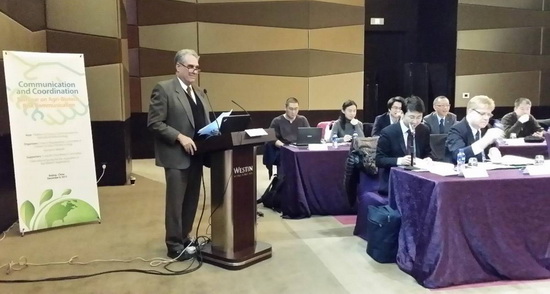
China Shares Biotech Commercialization Experience with Developed Countries
December 16, 2015| |
Over 60 representatives from Chinese government, academia, media, industry and Embassies of USA, Canada, Australia, Argentina, and Brazil gathered in Westin Hotel, Beijing, China on December 8, 2015 to promote biotech risk communication experience-sharing, strengthening communication and cooperation between government, academia, media and the industry in the dissemination of biotechnology.
In the opening remarks of the Seminar on Government and Public Communication of AgBiotech, Mr. Ye Jiming, Deputy Director General, Development Center of Science and Technology (DCST), China MOA pointed out that China is one of the earliest countries in the world to develop GM technology and had a relatively large planting area in the past. However, insufficient risk communication is becoming a major reason leading to the slowing down of developments in the last two years. Mr. Philip A. Shull, Agricultural Minister Counselor, U.S. Embassy stressed that to provide food for the world's population is most important, likewise the most noble mission. Biotechnology has made a very important role in providing food for the world and this fact should be well recognized by the public.
Dr. Zhen Zhu from Institute of Genetics and Developmental Biology, Chinese Academy of Sciences introduced the activities initiated by Platform of Science Communication for Agri-Biotechnology (PSCAB) and its effects in GMO knowledge dissemination. Dr. Anna Somerville, Counselor of Australian Embassy and Mr. Murray Gwyer, Counselor of Canadian Embassy shared experiences with biotechnology risk communication. Mr. John Cordts, Former USDA APHIS regulator presented U.S. approach to public input in the regulatory decision making process. Dr. Judy Wang, Senior Manager, Biotech Regulatory and External Affairs, Du Pont Pioneer North Asia, delivered the efforts of CropLife China in biotech communication from industry perspective.
In the open discussion section, the attendees discussed how to collaborate for efficient and effective GMO risk communication and build public knowledge and confidence in biotechnology.
The seminar was organized by Chinese Society of Biotechnology, supported by CropLife (China) Biotech Committee and ISAAA China Biotechnology Information Center.

For more information, send an email to zhangt@mail.las.ac.cn.
| |
Biotech Updates is a weekly newsletter of ISAAA, a not-for-profit organization. It is distributed for free to over 22,000 subscribers worldwide to inform them about the key developments in biosciences, especially in biotechnology. Your support will help us in our mission to feed the world with knowledge. You can help by donating as little as $10.
-
See more articles:
-
News from Around the World
- Paris Climate Agreement Recognizes Food Security as a Priority
- Nobel Laureate: GM Crops Vital to Address Malnutrion
- Farmers in Western Kenya Request for Speedy Commercialization of GM Cotton
- Kenya National Biosafety Authority Receives Public Comments on Bt Cotton Environmental Release Application
- Zambia National Biosafety Authority Launched
- Scientists Sequence Walnut Genome
- Vietnam Sets New Rules on Labeling GM Foods
- China Shares Biotech Commercialization Experience with Developed Countries
- First Map of Wheat Epigenome Created
-
Research Highlights
- Characterization of the Stress-inducible PLATZ Gene from Soybean
- JMJ704 Protein Regulates Rice Defense Response Against Xanthomonas oryzae pv. oryzae
- Expression of Silencing-Suppressor Protein Enhances the Performance of an Engineered Metabolic Pathway
-
Beyond Crop Biotech
- Enzyme-Producing GE Chicken Gets Approval in the US
- Genus and University of Missouri Develop Pigs Resistant to Incurable Disease
-
From the BICs
- IndoBIC Conducts Visit to Corn Research Stations in Malang, Indonesia
-
Read the latest: - Biotech Updates (February 18, 2026)
- Gene Editing Supplement (January 28, 2026)
- Gene Drive Supplement (February 22, 2023)
-
Subscribe to BU: - Share
- Tweet
